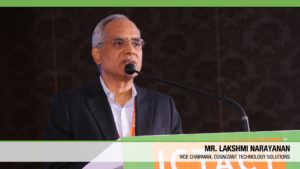Lakshmi Narayanan, CTS CEO to Creating Entrepreneurs

The Chennai chapter of global entrepreneurship driving organisation The Indus Entrepreneurs (TiE) will focus on encouraging business ideation and the spirit of enterprise in non-IT sectors, Lakshmi Narayanan, vice chairman of Cognizant Technologies and the new TiE Chennai president said on Tuesday.
Addressing a press meet after taking over reins from outgoing president R. Ramaraj, Mr. Narayanan said one of the first tasks would be to dispel the notion about the TiE, which was founded in Silicon Valley, being an organisation focused on fostering entrepreneurship in the IT/BPO sectors.
Membership expansion and taking it (TiE) beyond the IT and BPO sectors will be a key area of focus apart from reinforcing the mentoring mechanism, Mr. Narayanan said.
Some of the potentially exciting areas where investments could be made are renewable energy, auto components and electronics.
TiE Chennai, one of the best performing chapters of the global organisation with 55 branches, has considerable in-house mentoring expertise which is readily available for anyone with a strong business idea, Mr. Narayanan said. The free flow of funds to start up, sustain or scale up an enterprise is no longer the constraint; getting good ideas is. “TiE Chennai will strive to facilitate the free flow of ideas,” he said.
Mr. Ramaraj said the TiE Chennai had over the last five years seen significant growth in membership, number of events and initiatives apart from achieving higher visibility. TiECON Chennai, the marquee entrepreneurship networking event, was also growing in strength, he said.
Ref : The Hindu
His Interview :
Entrepreneurship development in India has been very weak when compared to the Western world? What are the key reasons?
Some of the reasons include fear of failure and lack of celebration of successes. First point is fear of failure. The industry circles will accept failure. One entrepreneur can appreciate the difficulties in creating an enterprise and can sympathise with another failing entrepreneur. The fear of failure is not among their peers, but in the eyes of the society.
The second one is we don’t celebrate enough of the successes that we have. For example, one of the three awardees of the Stree Shakti Awards (from TiE Chennai) is G Sree Vidhya who is running a services company. It used to be a small company. I know her personally.
And now I was really surprised and excited when it was classified as a success story in the medium enterprises category. This means a company that has scaled up from a small company to a medium company has won an award. Not many people know about Sree Vidhya as an entrepreneur or her company Ravindra Services.
What about fund availability?
It is not so much the funding problem, as much as the intellectual or the leadership mentoring that is available to these people. That’s the gap that TiE can clearly fill, because the successful entrepreneurs who have the intellectual capital are part of TiE.
In fact, there is a company called Smart Capital that provides intellectual capital, which is a member of TiE. The issue is not so much about ideas, because some of the young minds have phenomenal ideas. What they lack is access to talent.
What are the key aspects of mentorship as enabled by TiE here?
That’s the key and critical duty of TiE. It’s a global network. People have access to mentorship from anywhere. If an entrepreneur says I know Simi Ahuja sitting in New York who has this particular capability and needs to access it, TiE Chennai will arrange with the appropriate TIE chapter, so that the person’s capability is used
In fact, in India, mentorship is far more face-to-face and interactive than in the US. USA is a country of distances, where everything happens on telephone or through video conferencing, because people do not travel. Many of the successful entrepreneurs in the US have operations in India. So they visit India quite often and there is a lot more face time available to entrepreneurs in India than the US.
For instance, Sanjeev Bhikchandani, founder & CEO of Naukri.com, is a facilitator for the Chennai chapter. He is a champion. His time is available for any budding entrepreneur. And in the last one year, he would have probably travelled a dozen times to Chennai to mentor entrepreneurs here.
Of late, there has been an increasing number of tussles between entrepreneurs and private equity players. What is TiE doing about it?
It’s a question of control. The entrepreneur says I am giving too much to the VC, but the VC asks am I getting enough. TiE has special groups of people, who, depending upon the context, provide advice.
For instance, instead of the proportion of the pie, we focus on the size. However small the portion is, if the pie is made large enough, even that small portion would be substantial. As a person with expertise in building scale in Cognizant, I will step in and say this is the way to go about doing it. Forgot about whether it is 5 or 10%. At the end of the day, if it is huge pie, both 5% and 10% will be a meaningful stake.
Those are the type of things that TiE facilitates. It tells budding entrepreneurs how to approach VCs. Instead of waiting for the problems to come when they are growing the companies, we prepare their minds then and there.
Many young people do not know how to write a contract and get into legal tangles. IP is another important issue. We also help on these issues.






Leave a Reply